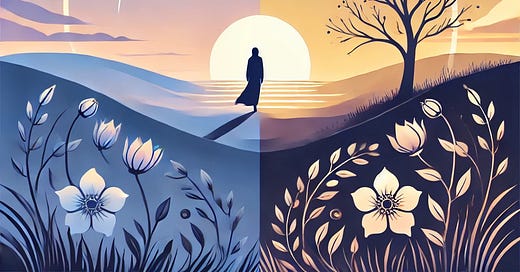Mind Candy is a newsletter on practical philosophy and human flourishment—aka how to live the “the good life.” Each month we tackle a new theme.
This month we’re exploring the theme of existentialism.
“Fear of death is fear of what we may experience. Nothing at all, or something quite new. But if we experience nothing, we can experience nothing bad. And if our experience changes, then our existence will change with it - change, but not cease.”
Marcus Aurelius
Meditations 8.58
While the life we hold is a blessing in that we are alive, it can also feel like a curse in that we are provided the knowledge that we cannot live forever.
Everything around us is in transition. The trees we see, the food we eat, the people we interact with. Everything and everyone is in a transition.
Some, like newborns, are blossoming for the first time, life awaiting them. But for others, they’ve lived life and are in their transitional period.
Everything we encounter, from nature to ourselves, will go through these transitions.
We will be here and then one day the time will come for us to no longer be. Unlike most other creatures who live life for survival, we have been endowed with the knowledge of our own mortality.
And we sit with that daily.
As a way of avoiding this truth, we craft stories, we build ideas around our invincibility—our superiority—to everything else.
Ernest Becker, who explored this in The Denial of Death, believed that we created these “hero complexes” as a way to cope with our own mortality, to avoid the harsh realities of life.
“What does it mean to be a hero? It means to be superior to nature… To be a hero means to triumph over human limitation.”
And so we try to. We ignore our own mortality, we act as though we’re invincible, only changing when we have a near death experience or a “scare”—it’s only then that we understand what mortality really means.
So while we spend most of our lives trying to understand how to live, it takes a lifetime to come to terms with not living.
The Roman orator Cicero once posed a fundamental question of our existence in his work On Old Age:
“Why is it that the wisest among us die most calmly, while the foolish die in the most distress?”
We’re distressed because we have not accepted the terms of reality and have not lived life fully. Instead we look around and say “but there is so much here for me, there’s so much left for me to do!”
And that’s true. But it will always be true, there will always be more experiences we wished to have, more friends we wanted to make, more moments with our children or grandchildren, more time.
“Only when the earlier years of life have been well spent does old age at last gather the fruits of admiration,” wrote Cicero.
When we embrace Cicero’s point, when we come to terms with the fact that life is a zero-sum game, that we cannot exist infinitely, that our lives will end, that’s when we can truly start winning. That’s when we can take a hard look at our life, at the actions (or inactions) we take each day and ask ourselves, “if this was my last day, am I spending it how I’d want to?”
Because at some point it becomes our last day. And we will need to learn to accept it.
There is no bargaining with the inevitable. No amount of begging or money or favors will shift the odds. They were written in stone from our first breath.
But this finitude frees us.
We’re free to live the life we want.
To create the memories we desire.
To spend our time how we want and not be drawn into matters that don’t truly matter all that much.
“Everyone gets one life,” wrote Marcus Aurelius in Meditations. “Yours is almost used up, and instead of treating yourself with respect, you have entrusted your own happiness to the souls of others.”
So, how will you spend the remainder of your days?
Until next time,
D.A. DiGerolamo
We are a participant in the Amazon Services LLC Associates Program, an affiliate advertising program designed to provide a means for sites to earn advertising fees by advertising and linking to Amazon.com.







